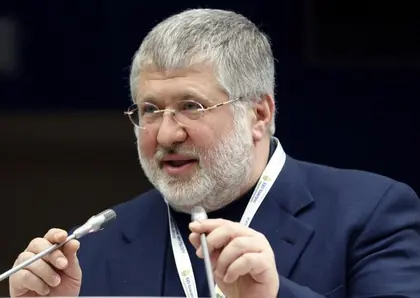The Ukrainian government acquired 100 percent of the shares of PrivatBank today, after the Cabinet of Ministers approved a request from the National Bank of Ukraine to place the country’s largest deposit holder under temporary administration, the Cabinet of Ministers said in a late Dec. 18 press release.
The bank’s controlling shares have been transferred to the state, starting a long and complicated nationalization process.
PrivatBank is the nation’s largest bank with 20 percent of the sector’s $53 billion in assets. It has been plagued by unpaid insider loans that left at least Hr 89 billion ($3.39 billion) hole in its ledger, the NBU reported on Dec. 13. The bank, however, has said that its insider loan portfolio amounts to only 10 percent of lending and that the bank is on schedule to recapitalize the institution to meet central bank requirements.
NBU Governor Valeriya Gontareva emphasized that PrivatBank’s clients would be protected, and that their deposits were now “guaranteed by the state.”
The bank’s owners, oligarchs Ihor Kolomoisky and Gennadiy Bogolyubov, could not be reached for comment.
The current management of PrivatBank will step down. Former Finance Minister Oleksandr Shlapak will take over as the new president of PrivatBank, replacing Oleksandr Dubilet.
The bank’s owners offered to sell the bank to the state themselves, Gontareva claimed at a Dec. 19 press conference.
Prime Minister Volodymyr Groysman canceled a planned trip to Brussels to stay in Kyiv this week to work on the issue, while both the NBU and Oschadbank have recalled employees back from vacation, according to Ukrainian news reports confirmed by NBU staff. A team of NBU and Deposit Guarantee Fund officials traveled to PrivatBank’s headquarters in Dnipro on Dec. 18 to formally take control of the institution.
The PrivatBank’s customers weren’t withdrawing long-term deposits in the days before nationalization, and only “an insignificant amount” of money was withdrawn from the current accounts, Gontareva said at the Dec. 19 press briefing with Finance Minister Oleksandr Danyliuk.
Gontareva and Danyliuk claimed that nothing will change for the bank’s customers.
“The bank continues to operate. All the ATMs will have enough cash,” Gontareva said.
However, there was at least one consequence reported: Immediately after the nationalization was announced, PrivatBank stopped almost all operations for its business accounts for one day, promising to resume the work on Dec. 20.
The state will sell PrivatBank after it is stabilized, Danyliuk said.
Problematic bank
The trigger for state action is said to be PrivatBank’s credit portfolio, infected with 80 percent insider loans. Questions have been raised about Kolomoisky’s willingness and ability to repay the loans or to bring the bank’s capitalization levels up to NBU standards.
Oleksandr Zavadetsky, a former NBU official who led the institution’s first insider lending monitoring office until October, said that the government first learned about the depth of the problem during a November 2015 diagnostic investigation. “The insider loans diagnostic on PrivatBank showed results that nobody expected to see,” Zavadetsky told the Kyiv Post. “It caused real anxiety among everyone.”
Ukraine’s reliance on International Monetary Fund loans has brought the issue to the top of the government’s agenda. The country has upwards of $3.5 billion in liabilities to pay off in 2017, which will be difficult without external support. Government sources say that the IMF has made resolving the PrivatBank problem a key condition of Ukraine receiving its next tranche.
“The IMF is saying you have to capitalize this bank, because if you do not capitalize…there will be huge pressure on the banks in Ukraine in this scenario and the banks which are undercapitalized such as PrivatBank will go immediately,” said Ihor Olekhov, an attorney at Baker McKenzie in Kyiv.
An NBU source, who spoke on condition of anonymity due to a lack of authorization to speak publicly, told the Kyiv Post that the bank is being nationalized under Article 41.1 of the law on guaranteeing deposits. Under the legislation, the government has the right to take over systemic banks via a buyout of shares. The only non-publicly owned bank that is categorized as systemic is PrivatBank.
The Cabinet of Ministers must formally approve any decision to buy out PrivatBank, setting in motion a process that will see the government issue billions of dollars in treasury bonds to recapitalize the bank. The question for Ukrainian taxpayers is whether Kolomoisky will actually pay up – or whether the government’s takeover of PrivatBank will mean bailing out one of the country’s most powerful oligarchs.
NBU sources say that Kolomoisky has committed to a three-year plan that could see him repay up to Hr 140 billion ($5.3 billion) in unpaid insider loans in order to cover the PrivatBank losses. Many, however, are skeptical that Kolomoisky will return the amount, given his history of shifting financial obligations to the state, his vast business holdings including airlines, media and oil, and his extensive political connections.
Why nationalization?
The NBU, as well as the International Monetary Fund, have been watching PrivatBank closely for months.
In September, the bank failed a stress test that, along with a three-year capitalization plan, was aimed at closing an Hr 89 billion ($3.39 billion) hole created by the bank’s shareholders failing to pay back insider loans.
Kolomoisky, who founded PrivatBank in 1992, may have loaned himself or related parties up to 80 percent of the bank’s credit portfolio, and not yet repaid most loans, according to documents leaked to BNE Intellinews in November.
Collateral for the bank’s Hr 180.4 billion ($6.8 billion) loan portfolio was found through NBU verification to be worth around Hr 31 billion ($1.1 billion). What Kolomoisky will be forced to repay is unclear.
PrivatBank has 20.5 million depositors who hold around $11 billion in assets, meaning that it holds roughly 73 percent of the market share of the country’s top 20 banks.
The risk of PrivatBank’s collapse became a source of political power for Kolomoisky since the economic crisis began, said political analyst Vitaly Bala. The Dnipro-born oligarch would threaten to default on the bank’s debts to keep the government from passing legislation that could cut into his business.
It’s unclear how the nationalization of PrivatBank will affect Kolomoisky’s power. He could retain key levers of control over the company, said financial analyst Ruslan Chornyy, enabling him to operate as before, with the Ukrainian taxpayers potentially footing another expensive bill.
You can also highlight the text and press Ctrl + Enter




